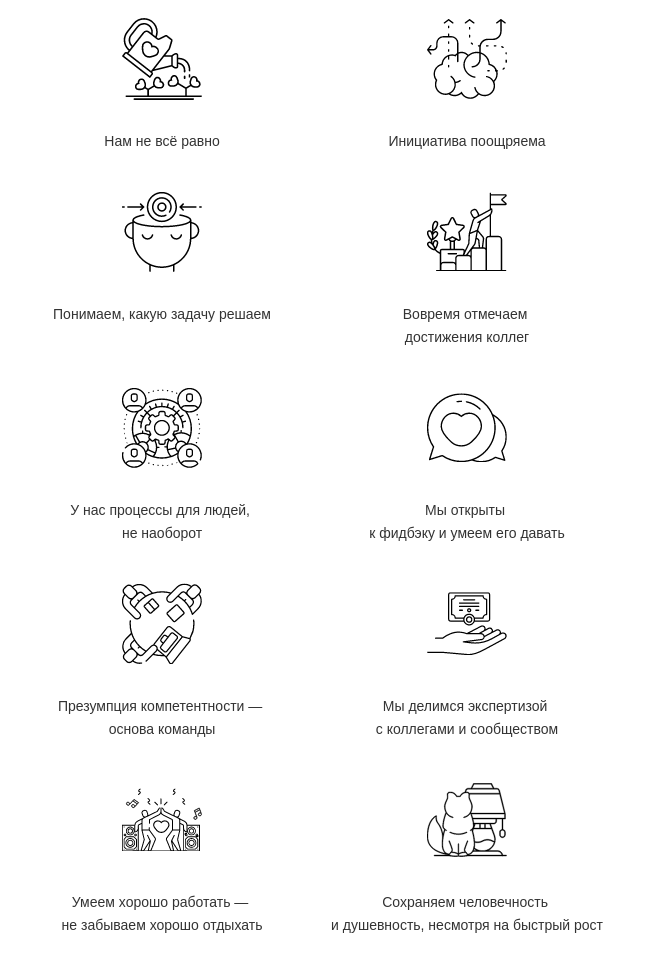
Many years ago, I came to the position of developer in one company and soon became a witness to an unusual scene. Timlid of the neighboring department called his subordinate in the middle of the working day and rather loudly and cheekily told him: “Hey, here's the money for you. Drive to the store, buy whiskey and snacks. ”
I thought: “Come on! All this is strange ... ". But the situation was repeated several more times. After working at the company for some time, I realized that such behavior there was the norm. Some teams were friends against others, podkovershchina flourished, and top management absolutely did not react to this. I left there, despite the fact that the tasks were interesting and the conditions were not bad. But the moral climate was unbearable.
Not only I thought so: now this company is no longer there. But at that moment I realized how important it is to work with informal relationships, how much they can have on the business as a whole. Moreover, line managers should work with them, first of all, not HR managers or full-time psychologists, because it is the leaders who are in daily contact with their subordinates.
But team leaders in the IT sphere, as a rule, themselves grew out of developers, engineers and do not have special education in the fields of psychology and management methodology. Because of this, managers often understand their tasks quite narrowly: they don’t understand why they need to babysit adults, why they need to solve a business problem, fulfill a plan, etc.
For the past ten years, I have been leading the development teams, seven of them in Badoo. This article is based on my presentation at Saint TeamLead Conf 2019 : in it I will try to explain how and why it is necessary to work on informal relationships in a team.
Informal Relationship Issues
How to determine that something bad is happening with informal relationships in a team? There are several markers.
Beginners don't linger
I’m sure that for most people, changing jobs is stressful. The newcomer is in an extremely uncomfortable, unstable situation, including because his experience and abilities in the new team are not confirmed. At the same time, he could be a significant and respected person at the previous place of work. In this case, the contrast will be even more noticeable and will cause even greater discomfort.
What does a person do to make himself known? He takes the initiative. But the initiative from new employees is often not emphasized: “Where are you going? We know how everything works here without you! ”
In addition, newcomers are often not involved in informal communication. Let's go to dinner - they didn’t call the newcomer. Someone's birthday is being celebrated - the newcomer was not invited. He is already stressed because of work issues, and there is no one to talk about this with. Doubly hard.
In these conditions, many simply decide to leave for another company.
Fellow strangers
The next problem is the ignorance of colleagues. More often this happens at the border of departments, and not within the same unit. Contractors do not know their internal customers and vice versa: for example, the product team and the development team are not familiar with each other.
The saddest thing is when leaders do not know their subordinates: they do not know their real expectations, they do not know how to motivate them.
Informal leaders in opposition to formal power
There are informal leaders in any team. Like other people, they have their own goals. The peculiarity of informal leaders is that they are able to involve other people in achieving their goals. If the goal of the informal leader does not lie in the plane of the goals of the organization, then such people can become very toxic. And the worst thing that can happen is that they can take part of the team to another company.
Disunity
All the problems that I have identified - poor work with newcomers, lack of communication, informal leaders in the opposition - lead to disunity. In the particular case, it can be illustrated by an eloquent meme:

People do not know what their colleagues are doing. Accordingly, they do not value their contribution to the common cause. Disunity leads to a lack of teamwork: team members do not complement each other, as a result of which tasks are solved inefficiently. There is no flexibility due to the fact that communications are not established. It is difficult for managers to motivate and raise their subordinates. All this leads to the fact that people leave.
And I want it to be good, at least like this:

Better yet, if like this:

What to do?
What should be done so that informal relations in your company are “correct” and work for the good of the business? I will talk about what we did and continue to do with us at Badoo. These are three important components:
- company culture;
- regular work on team building;
- reaction to devastating deviations.
Company culture
A company’s culture is a set of basic values that shape the way of thinking and norms of employee behavior. This is what unites people in a team, which sets the company apart from others and allows you to be proud of it. These are the values shared by most of the team.
Core values are not a constant. They can change, supplement depending on changes in the company's strategy. Do not invent them or blindly copy the values of other companies. Also, do not attract external experts, counting on the fact that they will create these values for you: values must be born within the company.
Once upon a time, I worked as a programmer in a network marketing company. The cult of the boss reigned in her: his portraits and quotes hung in the offices. All employees had to be passionaries, to make the world a better place. There, instead of the usual greeting, there was such a chant: “100 billion is our fate!” Now it seems ridiculous, and then it was not very fun. This is an example of how not to do it, an example of a pseudo-culture.
Back to Badoo. At some point, we got together, brainstormed and created a list of our basic values.

But what matters is not the list itself, but how we use it.
Firstly, we use it when hiring: we try to understand whether the candidates are ready to share our basic values. Secondly, we use it to evaluate employees: on a trial period, quarterly and semi-annual reviews.
How do we evaluate candidates for interviews? We ask certain questions. For example, about past mistakes; we learn the attitude towards them in order to understand how much a person has awareness, how self-critical he is and is able to learn from his mistakes.
We look at the reaction to questions for which the candidate does not know the answers. Many begin to bustle, take the conversation the other way, or immediately give up. We love when a person tries to logically reach the correct answer and, having already rested on the ceiling, honestly says that he does not know. In this case, we see that a person is able to admit that he does not understand something, and this is normal.
We ask if there are people whom the applicant has helped in his career and development, how he helped them. This is a sign that a person is open to the world, ready to help others.
We are interested in whether there are people from whom the candidate himself has learned something recently. This indirectly indicates how much a person, firstly, loves to learn, and secondly, he is grateful to the people who surround him and are ready to give him something new.
It is interesting to learn about the circumstances of leaving the previous place of work. Here we are interested not so much in the reason for dismissal, but in how the person transferred his duties: did he prepare everything or leave it, and burn it with a blue flame? This indicates responsibility.
Often people at the interview say they want to develop and therefore left the previous company. It is interesting to know: what prevented it from developing there? Answering this question, candidates sometimes begin to look for the guilty, say that the boss was somehow not like that, colleagues are stupid, etc. So we check how proactive the person is, how much he is ready to recognize his problem and do something for her solutions.
Team building work on a regular basis
Having realized and formulated the culture of the company, you need to work on team building. I broke it into several directions:
- work with informal leaders;
- work with beginners;
- work with complex employees;
- right meetings face to face;
- taking into account personal circumstances;
- elimination of disunity.
Informal leaders
Informal leaders are an effective tool in the hands of a team leader. Through them, we can project the company's goals on the rest of the team.
Do not push, but sell
The main thing in working with an informal leader is trust. You should not act in a directive, tell him what to do and how. You need to convince him that the task is important, its solution will make the company better. Or turn to him as an expert and ask: “Look, we have such a problem. What do you think is the best way to solve it? ” This confirms the authority of the leader, and he is his main tool and weapon.
Praise, appreciate
Timely praise the informal leader. This tip is suitable for interacting with any employee, but in the case of an informal leader, praise is even more important.
Do not infringe on authority
Do not question the authority of the informal leader, do not criticize him publicly and do not make fun of him. For you, he is not a rival: the formal leader and the informal leader play in different fields. The first has a bunch of tools for influencing the team, the second, by and large, only its influence and authority.
Accept feedback
Listen for feedback from informal leaders (about other employees, processes) - they appreciate it. The fact that you are listening also confirms the authority of the informal leader.
Lay formal responsibility
If possible, formal responsibility should be placed on the informal leader. In the future, this will destroy the motivation to go into opposition, and also satisfy the leadership ambitions of an informal leader.
Work with beginners
On the one hand, newcomers are those people who bring with them all the freshest, interesting, effective, which you probably did not know about. On the other hand, these are people who can potentially erode the company's culture.
What are we doing at Badoo?
Gentle onboarding
From the first day we appoint a newcomer curator. This can be a lead or any experienced employee who is ready at any time to answer questions from a beginner. We do not immediately throw a new employee to the solution of "combat" tasks and do not require much from him. The first few weeks, the newcomer simply enters the course of business in close contact with the curator.
Regular feedback
At first, newcomers are really looking forward to this, because, by and large, feedback for them is the only guideline and indicator of whether they are doing everything right or not. In Badoo, for the first two months, the manager meets one-on-one with the newcomer every week and discusses all the issues with him. It is important to be extremely careful with criticism during this period. It is, on the contrary, worth saying that making mistakes is normal, especially at first. It is useful to involve an HR specialist so that a beginner can give feedback to his supervisor: what he cannot say in person, he will tell the HR manager.
Involvement in informal communication
No need to leave beginners overboard informal communication. Let's go have dinner at the department - call a newbie. Celebrating someone's birthday - invite a newbie. He may refuse, but after some time he will necessarily agree. The main thing is to let him know that he is not superfluous, but a full member of the team.
Initiatives
It is also extremely important to work with initiatives carefully. This does not mean that you need to do everything that a beginner will offer. The burden of proving usefulness, changing the status quo in the company lies with the offering, that is, in this case, the new employee. If for some reason his initiative is unsuitable, try to reasonably talk to a professional as to why this is not suitable.
Help
At first, help for beginners is very important. We are all interested in the fact that the new employee adapts as quickly as possible and begins to solve combat tasks. Often, beginners are afraid to seek help because they think their questions are stupid. Today he has already approached once: once again he will come up - they will probably think that he is unprofessional. We explain that there is nothing wrong with this: you need to approach a colleague as soon as you “run into” a problem. I tried to figure it out for half an hour or an hour - and nothing happens? Come, otherwise you’ll only make everything worse.
Work with complex employees
Complex employees are people who work against the company's culture, against its core values. These are employees who systematically make disrespectful statements, try to undermine the authority of the leader, etc. How to work with them?
Understand the true motives of resistance
This may be an insult that you have not noticed, or it may be such a position in life: I am against, and that’s it. You can try to ask about it directly. If you find out what the problem is, it doesn’t work out and the person goes into a dead defense, you can try to talk with people with whom he communicates closely. Perhaps they will shed light on motives.
If the motives are clear, then try to come to an agreement.
Perhaps somewhere you have to compromise. If it is not possible to agree directly with the employee, you can try to attract a so-called parliamentarian, for example, an experienced HR specialist who will speak in private with the employee, speak in private with you, draw conclusions and give valuable recommendations to both.
Remove employee: for example, transfer to another team
There is a conflict on a personal level: people just do not like each other, and that’s all. In this case, you can try to transfer the person to another department so as not to lose a valuable employee.
Ignore
If the measures described above do not help, you can try to turn off the person from the processes in which he considers himself significant. This will strike at his authority and perhaps reason.
To dismiss
If this does not work, then there is only one option - to part with a difficult employee, because constant conflicts with him adversely affect the authority of the leader.
The right meetings one on one
Let me remind you that we are only talking about informal relationships. I believe that regular one-on-one meetings with employees is an excellent format in order to build a trusting relationship between a manager and subordinates. At 1: 1, in addition to working moments, it is worth paying attention to work-related issues.
- Give the first word to your subordinate. Perhaps, as they say, it’s boiling up and he was preparing. Do not interrupt him: let him speak out.
- Discuss the difficulties. Both workers and non-workers, which may affect work processes.
- Discuss your relationship with colleagues: is everything okay there. If you find out that there are any problems, then offer your help, or rather, ask how you as a leader can help. The main thing is not to forget to really help if the employee asks for it.
- The advice that I read in the book of Maxim Batyrev “45 manager tattoos”. At the end of the meeting, when everything seems to have been discussed, ask the question: “What else should we discuss?” Some people at this moment give out the most interesting.
Personal circumstances
If the leader and subordinate have a trusting relationship, then the subordinate can calmly inform you about some personal circumstances: the birth of a child, health problems, a mortgage, a divorce, etc. We are all human beings, and all kinds of things can happen.
What will a competent leader do in this case?
- Will give a respite. It will transfer from complex, critical projects to a low priority turnover.
- Send on vacation.
- Will revise the motivation scheme. If a person took a mortgage, his financial issue comes to the fore. So, you can give him a bonus, if there is anything (instead of the same letter).
- Change the schedule. For example, if a person has children went to the garden, you can adjust the start time of the working day. Why not?
When a manager hears people, takes into account their personal circumstances, it is appreciated. And vice versa: when a person knows that the leader is aware of his problems and does not take them into account, this gives rise to resentment.
Disconnect
I’ll tell you how we deal with disunity in Badoo.
Joint lunches
I was surprised to hear that in many companies, employees go to dinner alone or in pairs. This is extremely inefficient! After all, while we are waiting for the waiter, we can discuss a lot of things, learn something new about the people you work with. If the size of the office allows, you can organize a dining room, as we did. At lunchtime, people from different departments sit shoulder to shoulder and discuss a variety of topics: it works very well for team building.
Team building, corporate events with families
In our case, teambuildings are regular (once every three months) sorties anywhere: laser tag, bowling, billiards, just going to the bar. Participation in these events is voluntary. A day is chosen that is convenient for the majority, and we take into account beginners first of all, we try to involve them as much as possible.
Corporate events in our case are truly grandiose events, for example, trips in the summer for three days. This year we were in Krasnaya Polyana. We leave with families, but I know that this is a moot point. Yes, there are cons: of course, the cost, as well as the fact that families reduce the team building of the event. There are people who prefer to spend time with family rather than with colleagues. But we tried different formats and settled on that. First of all, it is much easier to get a family person out for a three-day event with his family than one, and most of us are family ones. Secondly, we get a loyal person from the side - spouse or spouse. And it often happens that families, having met at a corporate party, then continue friendly communication in everyday life.
Sports, hiking, rafting
This is a very simple and equally effective method of team building. We have running, triathlon and table tennis teams. Every year we go to rafting. In general, I consider this to be one of the most powerful ways to unite the team, because in unusual conditions for themselves, sometimes associated with extreme sports, people will learn completely new things about themselves and those around them.
Interest Clubs
Those who do not like sports can be carried away by playing checkers, chess, “What? Where? When?". About three years ago, our colleagues created a music group. Interestingly, many of its participants at that time either did not know how to play musical instruments at all, or did it very uncertainly. Most recently, they gave another concert at the office, and it was cool! I remember what pride I experienced from the kind of people I work with.
Hackathons
Also a pretty simple way. People from different departments gather to solve some interesting problem, not necessarily a working one. Pizza, beer, got together and created something together, but at the same time they learned a lot about each other - that it is impossible to find out in the process of working routine.
Reaction
The last block is about the reaction to various destructive phenomena that act against the basic values of the company, which means that they adversely affect the moral climate in the team.
Familiarity
When the leader and subordinate are too keen on their friendly communication, they risk crossing borders. In this case, the manager should always remember that he is a manager (even on joint boozes and partying), and firmly suppress going abroad, which he must outline for himself.
Disrespectful statements and actions
This is unacceptable and extremely destructive. This is what poisons the atmosphere in the team. Stop it as soon as you hear / see. And do not forget after to understand the reason. You need to understand if such behavior is based on personal hostility or a working conflict. You need to understand, untwist this in order to prevent the recurrence of such situations. For example, it happens that people cover up their own mistakes with the mistakes of other people or departments. Developers blame testers, testers blame developers. Often this happens because people simply do not know what the neighboring department is doing, do not appreciate its contribution to the common cause. You can work with this, for example, by creating channels to inform about the success of departments, so that employees understand who does what in the company and what their contribution is.
Rumors
The appearance of rumors is always the result of misinformation. Underinformation is a kind of vacuum that is filled with sewage. Having learned about the existence of some kind of rumor, the manager should explain as truthfully as possible how things really are, and then think about creating normal channels for delivering this kind of information: newsletters, digests, regular seminars, etc.
Not so long ago, we had a similar story at Badoo. The business decided to transfer part of the development from Moscow to London - a normal business requirement, as time shows, justified. But this gave rise to a rumor that the Moscow office was closing. This idea was so densely stuck in the heads of many employees that we had to make a lot of efforts in order to dispel the hearing. Just imagine the motivation of people who believed in it: “Why make any plans if they close us anyway soon?”
conclusions
How to make informal relationships work for the good of the business?
- Recognize and build a company culture. Hire people who share your values. Get rid of those who act against them.
- Work on team building regularly. Create and develop formats in which people can engage in informal relationships.
- Respond to devastating deviations. Remember that you are a manager, and therefore, the keeper of the culture of your company.
And most importantly: get to know your people! Properly weave informal relationships into workers. This will give you a complete picture, which, in turn, will allow you to make more informed decisions.